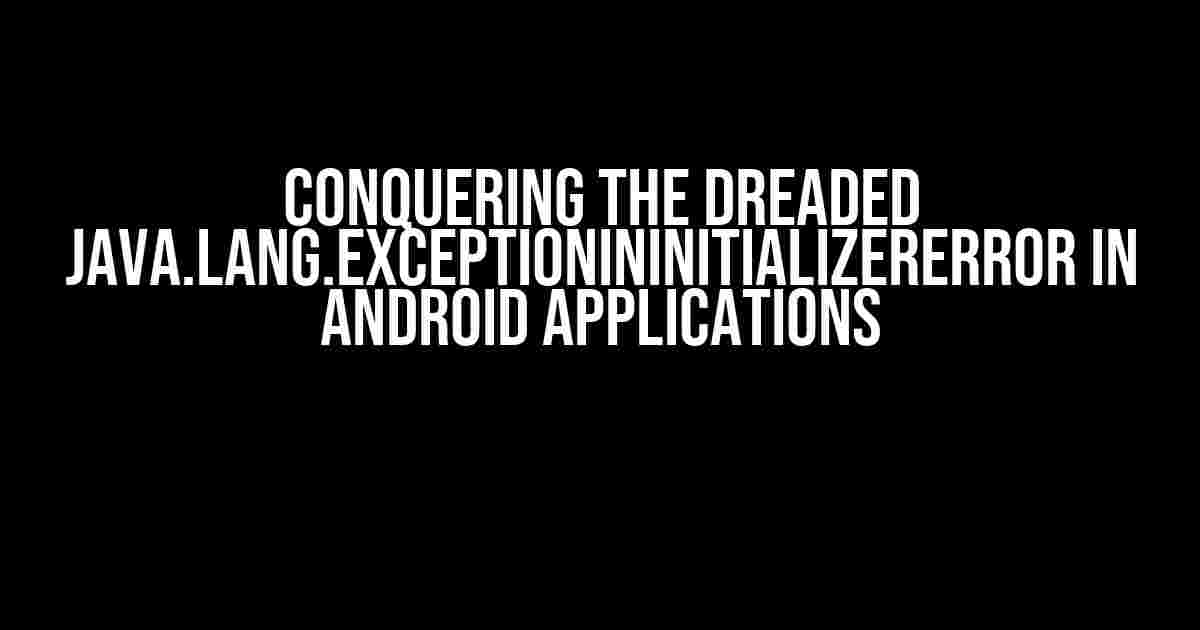Have you ever encountered the infamous java.lang.ExceptionInInitializerError while running your Android application? You’re not alone! This frustrating error can bring your development to a standstill, leaving you wondering what went wrong. Fear not, dear developer, for we’re about to embark on a quest to vanquish this error and get your app up and running smoothly.
What is a Java.Lang.ExceptionInInitializerError?
In Android, an ExceptionInInitializerError is thrown when an unexpected exception occurs during the initialization of a class. This error is a subclass of LinkageError and is typically triggered by a static initializer or the initialization of a static field. Think of it as a “catch-all” error that Android uses to indicate that something went wrong during the initialization process.
Common Causes of ExceptionInInitializerError
Before we dive into the solutions, let’s explore some common causes of this error:
-
Static initialization order issues:
- Initializing a static field before it’s declared
- Initializing a static field in a subclass before its superclass
- Initializing a static field in a dependency before it’s loaded
-
NullPointerExceptions during static initialization:
- Accessing a null object during static initialization
- Lazy initialization of a static field that depends on another static field
-
untime exceptions during static initialization:
- ArithmeticException, ArrayIndexOutOfBoundsException, etc.
-
Dependency issues:
- Missing or incorrect dependencies in the build.gradle file
- Incompatible library versions
Troubleshooting and Solutions
Now that we’ve covered the common causes, let’s get our detective hats on and start troubleshooting! Follow these steps to identify and fix the root cause of your ExceptionInInitializerError:
Step 1: Review Your Code
Take a closer look at your code, paying attention to static initializers, static fields, and their dependencies. Ask yourself:
- Are there any static fields being accessed before they’re declared?
- Are there any static fields being initialized in a subclass before their superclass?
- Are there any static fields being initialized in a dependency before it’s loaded?
Fix any issues you find, and try running your application again.
Step 2: Check for NullPointerExceptions
Look for any potential NullPointerExceptions during static initialization. Ask yourself:
- Am I accessing a null object during static initialization?
- Am I lazily initializing a static field that depends on another static field?
Fix any issues you find, and try running your application again.
Step 3: Handle Runtime Exceptions
Check for any runtime exceptions during static initialization. Ask yourself:
- Am I performing any arithmetic operations or array accesses during static initialization?
- Am I handling exceptions properly during static initialization?
Fix any issues you find, and try running your application again.
Step 4: Verify Dependencies
Make sure your dependencies are correct and compatible. Check your build.gradle file for:
- Mismatched library versions
- Missing or incorrect dependencies
Fix any issues you find, and try running your application again.
Advanced Debugging Techniques
If the above steps don’t resolve the issue, it’s time to bring out the big guns! Try these advanced debugging techniques:
Using Android Studio’s Debugger
Attach the debugger to your running application and set a breakpoint at the point where the error occurs. This will allow you to inspect the variables and execution flow.
Enabling Java Debugging
Add the following line to your AndroidManifest.xml file:
<application android:debuggable="true"></application>
This will enable Java debugging for your application.
Using the Android NDK Debugger
If you’re using native code, use the Android NDK debugger to inspect the native call stack.
Reviewing Crash Logs
Check the crash logs for any additional information about the error. You can find the crash logs in the Android Studio’s logcat window or in the device’s system logs.
Conclusion
Getting a java.lang.ExceptionInInitializerError while running your Android application can be frustrating, but by following these steps and using the advanced debugging techniques, you should be able to identify and fix the root cause of the error.
Remember to review your code carefully, check for NullPointerExceptions and runtime exceptions, verify dependencies, and use debugging tools to help you identify the issue.
With persistence and patience, you’ll be able to conquer this error and get your application running smoothly.
| Common Causes | Solutions |
|---|---|
| Static initialization order issues | Review code, fix initialization order |
| NullPointerExceptions during static initialization | Fix NullPointerExceptions, lazy initialization |
| Runtim exceptions during static initialization | Handle exceptions, fix arithmetic operations |
| Dependency issues | Verify dependencies, fix library versions |
Don’t let the java.lang.ExceptionInInitializerError hold you back from creating amazing Android applications. With this guide, you’re equipped to tackle this error and get back to building awesome apps!
Frequently Asked Question
Java.lang.ExceptionInInitializerError can be frustrating when it occurs while running an Android application, but don’t worry, we’ve got you covered!
What is java.lang.ExceptionInInitializerError and why does it occur in Android?
Java.lang.ExceptionInInitializerError is a runtime exception that occurs when an unexpected exception occurs during the initialization of a static initializer. In Android, it can occur due to various reasons such as null pointer exceptions, class cast exceptions, or other runtime exceptions that occur during the initialization of a static block or a static variable.
How to identify the cause of java.lang.ExceptionInInitializerError in Android?
To identify the cause of java.lang.ExceptionInInitializerError, you need to analyze the stack trace of the exception. The stack trace will provide information about the class and method where the exception occurred. You can also use debugging tools such as Android Studio’s debugger or crash reporting tools like Crashlytics to identify the root cause of the issue.
How to fix java.lang.ExceptionInInitializerError in Android due to static block initialization?
To fix java.lang.ExceptionInInitializerError due to static block initialization, you need to ensure that the static block does not throw any exceptions. You can do this by wrapping the code in the static block with a try-catch block and logging the exception. You can also reconsider the design of your static block and ensure that it does not perform any operations that can throw exceptions.
Can java.lang.ExceptionInInitializerError occur due to Android SDK or library issues?
Yes, java.lang.ExceptionInInitializerError can occur due to Android SDK or library issues. For example, if a library is not compatible with the Android version or has a bug, it can cause an exception during initialization. Similarly, if the Android SDK is not properly configured or has a bug, it can also cause an exception. In such cases, you need to update the library or SDK to the latest version or report the issue to the developer.
How to prevent java.lang.ExceptionInInitializerError in Android applications?
To prevent java.lang.ExceptionInInitializerError in Android applications, you need to ensure that your code is robust and handles exceptions properly. You should also test your application thoroughly to identify and fix any issues during the development phase. Additionally, you can use code analysis tools and testing frameworks to identify potential issues before they occur.


